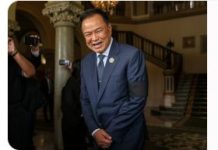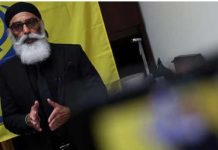Tehran, JUL 1: Iranian Foreign Minister Abbas Araghchi has asserted that Iran’s scientific knowledge and capacity for uranium enrichment cannot be destroyed through military aggression, stressing that the country’s peaceful nuclear industry is deeply rooted in national resilience and technological advancement.
“One cannot obliterate the technology and science for [peaceful uranium] enrichment through bombings,” Araghchi said in an interview with CBS News aired on Tuesday, in his first detailed remarks since the Israeli regime launched military strikes on Iran’s nuclear sites earlier this month.
The comments come after US President Donald Trump claimed that American strikes had “obliterated” Iran’s nuclear sites — a statement that has since been contradicted by assessments from within the US Department of Defense.
Israel began its military campaign against Iran on June 13, targeting nuclear and military infrastructure in what Tehran has described as an unprovoked war. The United States, already providing significant military and intelligence support to Tel Aviv, joined the offensive towards the end of the 12-day conflict, carrying out its own strikes on key nuclear facilities in Iran’s central and north-central regions.
Despite the attacks, Araghchi insisted that the damage was reparable and said the country was determined to restore and advance its nuclear programme.
“If there is this will on our part — and the will exists — we will be able to expeditiously repair the damages and make up for the lost time,” he stated, underscoring the symbolic and strategic importance of the nuclear industry for the Iranian people.
National pride
Araghchi pointed out that Iran’s nuclear programme, while peaceful in nature, has become a matter of national pride, especially following the country’s successful defence during the recent hostilities.
“We have also gone through 12 days of imposed war; therefore, people will not easily back down from enrichment,” he said. “During the war, we demonstrated and proved our ability to defend ourselves.”
The foreign minister reiterated that Iran would not hesitate to respond in self-defence should it face renewed military aggression.
On the prospect of restarting diplomatic talks with the United States, Araghchi expressed scepticism and said Tehran was in no rush to return to the negotiating table.
“I don’t think negotiations will restart as quickly as that,” he said. “In order for us to decide to reengage, we will have to first ensure that America will not revert back to targeting us in a military attack” during any diplomatic process.
Talks unlikely to resume soon
The remarks come amid uncertainty surrounding the future of indirect talks between Tehran and Washington. Negotiations mediated by Oman began in April and lasted for six rounds, but were marred by US demands — echoed by Israel — that Iran completely halt its uranium enrichment activities, a condition Tehran has repeatedly ruled out.
The recent US military strikes have further undermined trust between the two sides, with Iranian officials questioning the Biden administration’s commitment to diplomacy.
“If diplomacy was truly being given a chance,” one Iranian official noted separately this week, “why did Washington choose the path of aggression?”

















